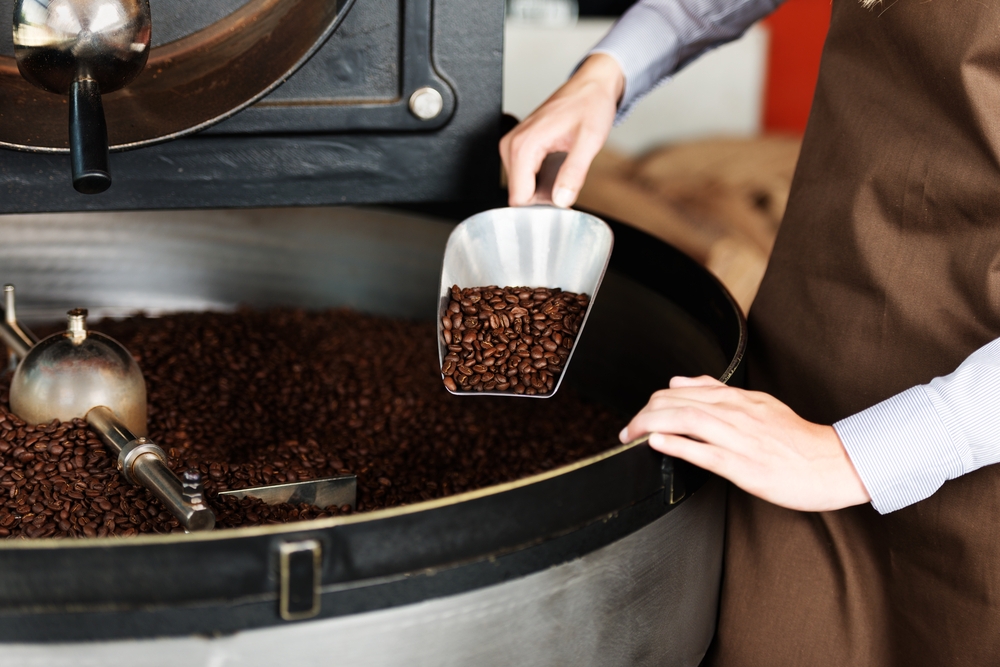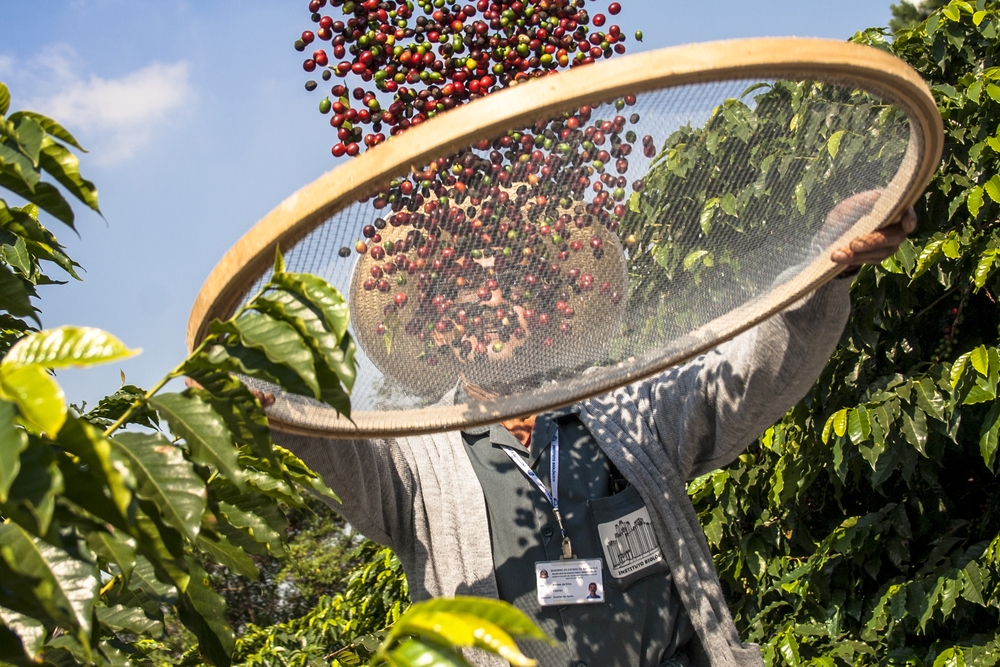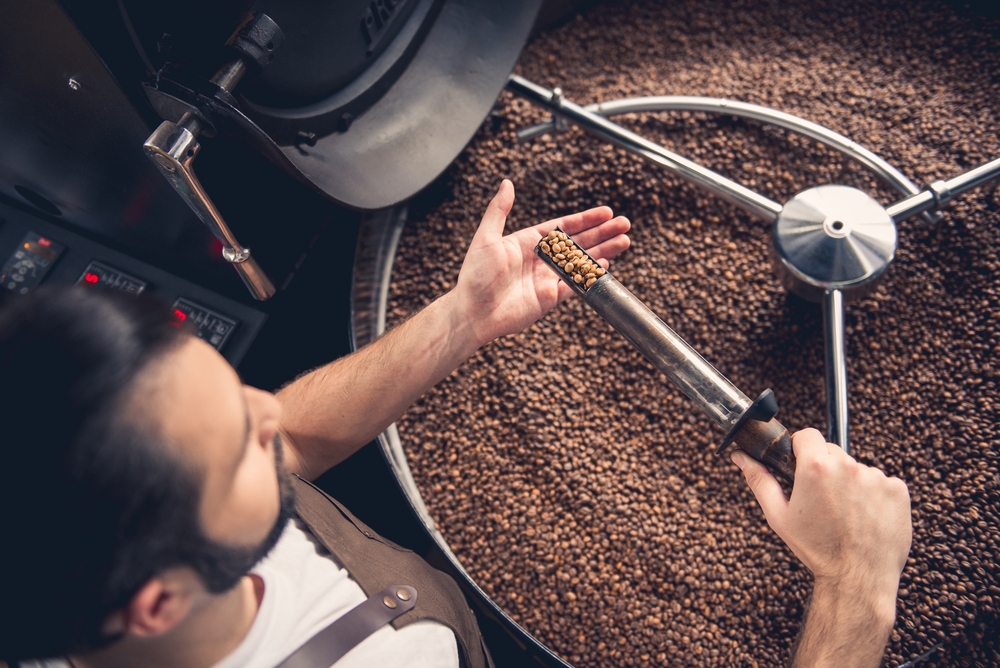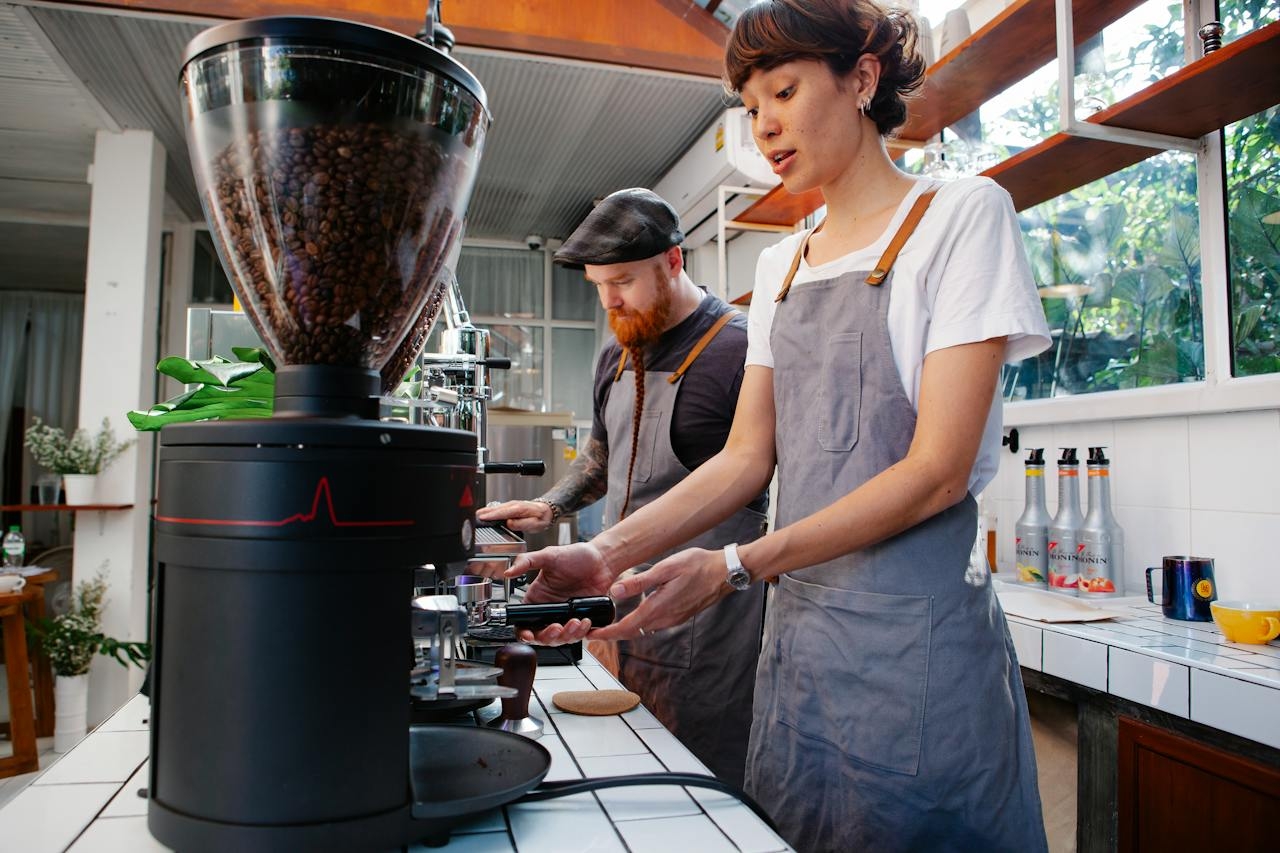Discover Why Having a Roastery in Your Coffee Shop Creates a More Authentic Experience
By Nikita Nielsen · 13. February 2024
Ever wondered what’s stirring up all the excitement about in-house coffee roasting?
Discover how integrating a roastery into your café can transform the consumer experience by serving the freshest coffee☕️, enriching the taste, and fostering a genuine connection to the coffee’s origins.
Let’s explore the ways in which roasting on the premises can enhance your customer’s journey, set your brand apart, and lay the foundation for a thriving coffee community within your establishment.
The Essence of Freshness: Roasting On-Site
 coffee roasting
coffee roasting
Freshness is the distinguishing factor that elevates a cup of coffee from mediocre to heavenly.
When coffee shops roast their own beans on-site, they unlock the freshest flavors and aromas, elevating the coffee experience to new heights.
On-site roasting follows a dramatic journey through three key stages – drying, browning, and development.
Each stage plays a vital role in crafting the coffee’s exquisite flavor and aroma, ensuring the utmost freshness and quality.
Embarking on this aromatic adventure requires coffee shops to equip themselves with some essential tools:
- A coffee roaster machine
- A thermometer
- A cooling tray
- Handy extras like filters or cups for the final masterpiece
This equipment allows them to control the roasting process and fine-tune the results, giving them a significant advantage over coffee shops that rely on pre-roasted beans from a local roaster.
In the realm of specialty coffee, bean freshness critically influences the quality of the brewed coffee.
By roasting their own beans, coffee shops can deliver a superior coffee experience, meeting consumer trends for high-quality, freshly roasted coffee.
It’s a game-changer that sets the average coffee shop apart from those that roast their own beans.
The Aroma Factor: Engaging the Senses
 coffee production
coffee production
Far from being just a treat for the nose, the aroma of freshly roasted coffee serves as a potent sensory stimulant, capable of:
- Uplifting and energizing the mind
- Elevating customer performance expectations
- Boosting satisfaction
- Enriching the overall consumer experience.
The captivating scent of coffee results from over 1000 chemical compounds that awaken during the roasting process.
These compounds create a complex and sensory stimulating experience that is more pronounced in freshly roasted beans compared to their pre-packaged counterparts.
The aroma of freshly roasted coffee beans offers an intense and immersive sensory experience for the customers.
While pre-packaged beans may not offer the same level of freshness, they still play an important role in the coffee industry, providing convenience and consistency.
The aroma of freshly roasted coffee, however, sets the stage for a superior coffee experience, creating a positive impression of the coffee shop and an investment in quality that can lead to increased customer satisfaction and sales.
Transparency in Coffee Production
 coffee production farm
coffee production farm
As consumers grow increasingly conscious of their food sources, the importance of transparency in coffee production has never been greater.
When customers can peek behind the coffee curtain and know the nitty-gritty details of its production, it creates a feeling of trust.
Roasting coffee in-house spills the beans on how ethically and sustainably the coffee beans were grown, giving consumers, buyers, and shops a front-row seat to the whole process.
Responsible coffee buying hinges on:
- Transparency
- Support for eco-friendly methods
- Fair treatment and remuneration for hardworking farmers
- Fostering community growth
In-house coffee roasters allow coffee shops to demonstrate these practices, building trust with customers and strengthening their own brand in the process, which is essential for a successful coffee roasting business.
Roasters have the opportunity to showcase their commitment to sustainability in coffee production by backing farmers in their supply chain, acquiring beans from sustainable sources, and minimizing carbon emissions.
All these efforts contribute to the overall transparency in the coffee production process and boost the coffee shop’s reputation.
Cultivating a Coffee Culture
 in-house coffee production
in-house coffee production
Coffee culture transcends being merely a trend to become a lifestyle. It’s about the traditions and social behaviors that come with drinking coffee, especially when it’s a group thing.
In-house roast coffee plays a central role in cultivating this culture.
It gives coffee shops the power to play around with custom roasts, building a delightful link to the source, and whipping up one-of-a-kind flavor profiles.
Part of cultivating a coffee culture involves:
- Understanding the roasting process
- Learning about bean origins
- Exploring different flavor profiles
- Appreciating the artistry behind every sip
- Understanding how the origin stories, farming techniques, and processing methods come together to create that perfect cup of coffee.
Personalized Roast Profiles and Blends
Personalization reigns supreme in the world of coffee. Having personalized roast profiles is like having a secret recipe that makes the coffee experience top-notch.
It’s all about customization and achieving that perfect roast every time.
The roast profile is essential in developing the unique flavors and aromas of coffee.
Light roasts preserve the original character of the beans, often resulting in a brighter, more acidic flavor profile, while dark roasts transform the beans to create deeper, more intense tastes.
Coffee shops have the power to concoct their own special blends by mixing various coffee beans in just the right proportions, resulting in a one-of-a-kind blend.
Coffee shop owners can even let customers play the role of coffee☕️creators and create their own personalized blends by choosing their favorite coffee bean combinations.
This level of personalization not only enhances the customer’s coffee experience but also gives the coffee shop an edge in the market.
Economic Advantages of Roasting In-House
Economically speaking, in-house coffee roasting is a smart move for coffee shops.
By purchasing green beans and roasting them in-house, coffee shops can significantly reduce their costs compared to buying pre-roasted beans.
In-house coffee roasting offers several benefits for coffee shops:
- It allows them to purchase better quality coffee at lower prices
- It enables them to create unique roast profiles
- It helps them build a strong brand that resonates with customers
- It draws in more customers who are willing to pay a premium for the unparalleled freshness provided
Overall, in-house coffee roasting boosts a coffee shop’s profit💰 margins and enhances the overall coffee experience for customers.
But the economic benefits of in-house roasting don’t stop there. Selling freshly roasted beans can brew up some serious cash for coffee shops.
It’s not just about offering customers a unique product, but also giving them the chance to savor that top-notch coffee experience at home.
Plus, they can charge a premium for these beans, which supports farmers with fair prices and opens the door to wholesale opportunities with a wholesale coffee roaster.
Building a Community Around Craft Coffee
The opportunity to foster a community around craft coffee stands as one of the most rewarding aspects of in-house coffee roasting.
This sense of community contributes to customer loyalty by giving them a chance to connect, share their thoughts, and be part of something special.
In-house roasting can contribute to building this community by offering unique flavors, hosting coffee-related events, and educating customers about the coffee process.
The community around craft coffee is more than just a group of regular customers; it’s a group of coffee enthusiasts who appreciate the art of coffee making and value the coffee experience a coffee shop offers.
This community can become a powerful marketing tool, attracting new customers and fostering a sense of belonging among patrons.
Enhancing the Brew: Synergy Between Barista and Roaster
 Espresso Machine
Espresso Machine
In-house roasting boosts the brew quality by nurturing a synergistic bond between the barista and roaster.
It turns baristas into coffee wizards, giving them the power to brew up unique flavors and bond with coffee farmers and importers.
This synergy can enhance the quality of the coffee by allowing them to fine-tune the roasting process, leading to a seriously delicious end product.
The interaction between barista and roaster extends beyond coffee – it embodies an entire movement for sustainability, education, and sharing the passion for coffee.
And when baristas and roasters team up, they ensure every cup is consistently amazing, adding extra value to the whole experience.
By giving customers an engaging and educational atmosphere where they can learn about roasting, flavor profiles, and all things coffee, the barista-roaster interaction enhances the customer’s coffee experience.
Summary
In conclusion, roasting coffee in-house offers a myriad of benefits for coffee shops.
It ensures maximum freshness, engages the senses, fosters transparency, builds a unique coffee culture, allows for customization, provides economic benefits, and creates a community.
So, whether you’re a coffee shop owner looking to elevate your business or a coffee lover looking for the next level coffee experience, remember that roasting in-house is the secret ingredient to a perfect cup of coffee☕️.
Frequently Asked Questions
What are the benefits of roasting your own coffee?
Roasting your own coffee ensures maximum freshness, as green coffee beans are unroasted, and it doesn’t get any fresher than that unless you’re picking the beans yourself.
What is the purpose of a coffee roaster?
The purpose of a coffee roaster is to apply heat to coffee beans in order to transform them from green to roasted beans, enhancing their flavor and aroma.
What are the qualities of a good coffee roaster?
A good coffee roaster should have a keen sense of taste to identify different flavors in the beans, ensuring they produce high-quality and unique-tasting coffee.
How does roasting affect coffee?
Roasting coffee unlocks its delightful aroma and flavor, transforming the soft, grassy green beans into the rich, aromatic ones we love. The Maillard reaction during roasting also impacts the antioxidant and anti-inflammatory properties of coffee.
Why is the freshness of coffee so important?
The freshness of coffee is crucial as it greatly impacts its taste and aroma. Freshly roasted coffee ensures the best flavor and aroma experience.

